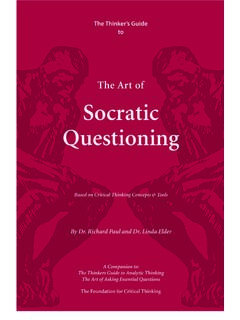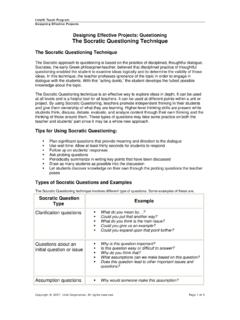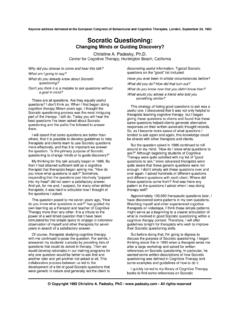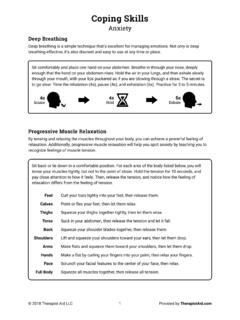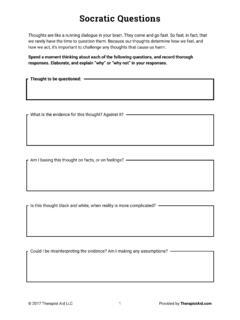Transcription of TYPES OF QUESTIONS
1 QUESTIONSAn analytical approach for re analytical approach for re ading. The une xamined life is not worth li ving The Critical Mind is a Que stioning Mind The key to powerful thinking is powerful que key to purposeful re ading is purposeful que TYPES OF QUESTIONS : 1. Factual 2. Interpre ti ve3. Evaluati veFACTUAL QUESTIONSFACTUAL QUESTIONSEver yone will e ventually agree on the QUESTIONSEver yone will e ventually agree on the words that are uncle QUESTIONSEver yone will e ventually agree on the words that are uncle y factual elements of the QUESTIONSWhat is me ant by what is said?INTERPRETIVE QUESTIONSWhat is me ant by what is said?INTERPRETIVE QUESTIONSMust be an hone st que stion that require s re turning to the te is me ant by what is said?
2 INTERPRETIVE QUESTIONSMust be an hone st que stion that require s re turning to the te the re ader into a deeper understanding of the work .What is me ant by what is said?INTERPRETIVE QUESTIONSMust be an hone st que stion that require s re turning to the te the re ader into a deeper understanding of the work .Answers must be supported f rom the te is me ant by what is said?INTERPRETIVE QUESTIONSMust be an hone st que stion that require s re turning to the te the re ader into a deeper understanding of the work .Answers must be supported f rom the te ter discussion, some que stions might remain unre ve Que stionsEvaluati ve Que stionsThis is the only t ype of que stion in which your personal opinion can be ve Que stionsThis is the only t ype of que stion in which your personal opinion can be short, what do you think about some ide a or theme that is pre sented in the work?
3 The Art of Que stioningWhat is the purpose? What is the goal? What is the agenda? What is the main problem? What is the crucial issue? What is the key information? What conclusions can I re ach? How can I interpre t the information? What is re ally going on? Why should I care? What assumptions am I making? What assumptions is the author or spe aker making? What are the implications? What is the author s point of vie w? What is my point of vie w? What information is missing? What additional que stions could I ask?Purposeful Re ading Understand your purpose in re ading Understand the author s purpose in writing De termine how ide as in a te xt are interconnected Look for and understand systems of me aning Engage in the te xt while re ading - re ading is an acti ve proce ss!
4 Move past impre ssionistic re ading Formulate que stions and seek answers to those que stions while re fecti ve Discussion At tenti ve listening. Incorporation of factual, interpre ti ve, and e valuati ve que stions. Equal, balanced participation. Que stioning which e xtends thinking (Socratic). Comments to share ide as, to clarif y the ide as of others, to e xtend thinking , to show support, and to pre sent multiple (dif ferent) perspecti ve s. Comments that redirect discussion back to important or rele vant topics. Comments and que stions that addre ss ide as, not Que stionsQue stions define tasks, e xpre ss problems and deline ate issue s. Answers of ten signal a full stop in que stions equals no understanding. Most students t ypically have no intellectual que stions.
5 They not only sit in silence, their minds are silent as well. Intellectual fields of study are born of que stions to which answers are needed. Ever y field stays ali ve only to the e xtent that f re sh que stions are generated and e xplored. Gre at advance s in thought, in technology, in the arts, of ten arise f rom ef forts to find answers to fundamental que at ThinkersWhen we consider the work of Einstein, Dar win, and Ne wton, we find, not the unfathomable, genius mind. Rather we find thinkers who placed deep and fundamental que stions at the he art of their work and pursued them se arch for answers to fundamental que stions can le ad to ne w paradigms. Reference s:The Critical Mind is a Que stioning Mind ht tp://w w Role of Socratic Que stioning in Thinking , te aching , and Le arning ht tp://w w

